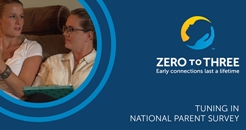 The 'Missing' First Year?
The 'Missing' First Year?
Zero to Three, an organisation in the USA, undertook comprehensive research in summer/autumn 2015 wth a nationally (USA) representative sample of 2,200 parents of children birth to 5 years to gain a clear and in-depth understanding about the challenges they face, the help they seek and how satisfied they are with the support and information they receive.
Although their findings may not be representative of the UK, I was provoked by a couple of their insights and I'm wondering how applicable they could be here.
There is a "missing" first year
While parents have a general understanding that what happens in a child’s early years can last a lifetime, many don’t realize at what age babies and toddlers can begin to feel complex emotions. A notable portion of parents miss the mark by months, or even years. Parents also don’t realize how deeply children can be affected by the way parents interact with them in the first months of life.
The time of most rapid brain development occurs during the first 3 years. While 63% of parents identified this correctly, more than 34% said that the time of most rapid brain growth is 3 to 5 years, a significant underestimation of the importance of the earliest years.
Parents overall consistently underestimate just how early children can be affected by some critical experiences:
-
When asked at what age the quality of a parent’s care has a long-term impact on a child’s development, 50% of parents said this begins at 6 months or older, when in fact it starts at birth;
-
When asked to identify the age at which children can begin to feel sad or fearful, 42% of parents say one year or older. In fact, this happens as early as 3-5 months.
-
Nearly half of parents think that reading to children starts to benefit long-term language development about a year and a half later than it actually does: 45% say the benefits start at 2 years or older. In reality, benefits begin at about 6 months.
-
34% of parents believe that talking to children starts to benefit their language skills at a year old or later, when in fact it begins at birth.
There is an expectation gap when it comes to understanding children's capabilities
There are misunderstandings about when children are capable of self-control and the timing of other developmental milestones:
-
43% of parents think children can share and take turns with other children before age 2, and 71% believe children have this ability before age 3. In fact, this skill develops between 3 to 4 years.
-
36% of parents surveyed said that children under age 2 have enough impulse control to resist the desire to do something forbidden, and 56% said this happens before age 3. In fact, most children are not able to master this until between 3.5 to 4 years of age.
-
47% of parents want to learn more about how and when children develop self-control. 42% want to know more about what skills to expect at different ages.
-
32% of parents thought that children 3 years or older can understand the intent of another person’s actions. In fact. children develop this from about 15 months.
-
49% of parents thought that children 3 years or older can be aware others have different feelings and thoughts. In fact, this happens from 18 months onwards.
The good news is that across demographic segments, parents want to improve their parenting and seek help in doing so:
-
83% of parents from all backgrounds agree that good parenting can be learned.
-
69% of parents say that if they knew more positive parenting strategies they would use them.
-
54% of parents wish they had more information about how to be a better parent.
Download the summary report
here.
Why not connect with expectant parents and parents of 0-5s locally through distributing these educational downloadable resources which you can modify to advertise your parents and toddler group or parenting courses?
Retweet about this article:
Geoff Knott, 24/01/2017